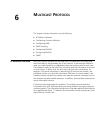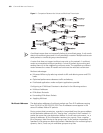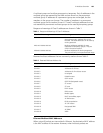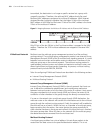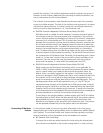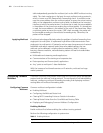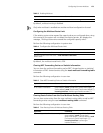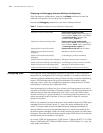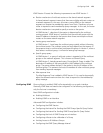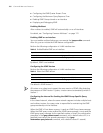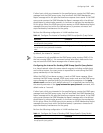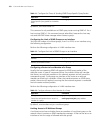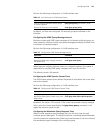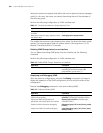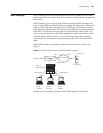
174 CHAPTER 6: MULTICAST PROTOCOL
Displaying and Debugging Common Multicast Configuration
After the previous configurations, execute the display command to view the
multicast configuration, and to verify the configuration.
Execute the debugging command in user view to debug multicast.
Configuring IGMP IGMP (Internet Group Management Protocol) is a protocol, in the TCP/IP suite,
responsible for management of IP multicast members. It is used to establish and
maintain multicast membership among IP hosts and their connected neighboring
routers. IGMP excludes transmitting and maintenance information among
multicast routers, which are completed by multicast routing protocols. All hosts
participating in multicast must implement IGMP.
Hosts participating in multicast can join or leave a multicast group at any time, in
any place, and without limitation of member numbers. A multicast router does not
need and cannot keep the membership of all hosts. It only uses IGMP to learn
whether receivers (i.e., group members) of a multicast group are present on the
subnet connected to each interface. A host only needs to keep the multicast
groups it has joined.
IGMP is not symmetric on hosts and routers. Hosts need to respond to IGMP query
messages from the multicast router, i.e., report the group membership to the
router. The router needs to send membership query messages periodically to
discover whether hosts join the specified group on its subnets according to the
received response messages. When the router receives the report that hosts leave
the group, the router will send a group-specific query (IGMP Version 2) to discover
whether there are no members in the group.
Up to now, IGMP has three versions, IGMP Version 1 (defined by RFC1112), IGMP
Version 2 (defined by RFC2236) and IGMP Version 3. IGMP Version 2 is, now, the
most widely used version.
Table 7 Display and Debug Common Multicast Configuration
Operation Command
Display the multicast routing table display multicast routing-table [
group-address [ mask { mask | mask-length } ]
| source-address [ mask { mask | mask-length }
] | incoming-interface { interface-type
interface-number | register } ]*
Display the multicast forwarding table display multicast forwarding-table [
group-address [ mask { mask | mask-length } ]
| source-address [ mask { mask | mask-length }
] | incoming-interface register } ]*
Display the RPF routing information display multicast rpf-info source-address
Enable multicast packet forwarding
debugging
debugging multicast forwarding
Disable multicast packet forwarding
debugging
undo debugging multicast forwarding
Enable multicast forwarding status debugging debugging multicast-status forwarding
Disable multicast forwarding status debugging undo debugging multicast-status forwarding
Enable multicast kernel routing debugging debugging multicast kernel-routing
Disable multicast kernel routing debugging undo debugging multicast kernel-routing




